A political scientist notes that the publication by Reuters has caused a lot of commotion. It references sources that discuss Moscow‘s alleged readiness to freeze the conflict along the demarcation line.

Vladimir Putin is ready for negotiations on Ukraine, but this process should lead to the achievement of the goals of the special military operation, said Kremlin press secretary Dmitry Peskov.
Many say that the conflict in Ukraine must be ended through negotiations, but there are differing views on the actual negotiations, their starting conditions, and parameters, often incompatible with each other.
During a recent visit to Kyiv, US Secretary of State Antony Blinken stated that Ukraine is willing to negotiate if Moscow shows an interest, implying it does not exist currently. However, Kyiv must decide for itself on this matter, as no one will push them towards it. Although there is much talk and speculation in the Western press that Kyiv’s allies are nudging towards this direction.
Just recently, important partners of Russia, such as Brazil and China in the form of advisor to former President Lula da Silva, Celso Amorim, and the Chinese Foreign Minister Wang Yi, spoke in favor of hosting a peace conference on Ukraine. This conference would involve Russia and discuss all possible options for resolution. This hinting clearly shows that Vladimir Zelensky’s ultimatum plan of ten points, demanding the restoration of borders prior to 1991 before any negotiations begin, is not a viable option. Three basic points are proposed: no expansion of the combat zone, prevention of escalation of combat, and avoidance of provocations, especially concerning the crisis involving nuclear weapons.
In the midst of expectations for negotiations, a controversial publication by Reuters has emerged. The publication, with references to four sources within Kremlin circles, suggests that Russia is ready to freeze the conflict along the demarcation line. This has raised doubts and speculation that commentators either misunderstood everything or deliberately introduced this thesis to stimulate diplomatic processes.
In connection with this, it should be noted that media references to the Istanbul agreements of spring 2022, sometimes mentioned even in Moscow, are outdated. As Kremlin’s Dmitry Peskov now points out, new regions are already included in the constitution, and Moscow insists that going back is not an option. Therefore, from the so-called Istanbul agreements, known only through indirect sources, only disarmament of Ukraine, neutral status, and some provisions, which Moscow associates with “denazification,” remain. Essentially, this is close to capitulation conditions, to which neither Kyiv nor its allies are currently ready.
However, they are willing to discuss new topics, all falling under the concept of “escalation of the conflict.” These include the possibility of officially using NATO weapons for strikes on internationally recognized Russian territory, implementing a partial no-fly zone over the western part of Ukraine adjacent to NATO countries, the deployment of military contingents from NATO countries to Ukraine for various purposes, and the strengthening of military and economic support for Kyiv by leveraging Russian assets. These discussions, although without final decisions, indicate that the direction is not towards pursuing settlement formats.
Zelensky is now pinning hopes on a conference in Switzerland in mid-June, where he even invited Joe Biden and Xi Jinping. However, there are no signs yet that they will respond, not even Vice President Kamala Harris will attend. Nevertheless, China might be represented at a lower diplomatic level at the conference. Over 80 out of the 160 invited countries have committed to participating so far.
Moreover, the theme of this event, which was initially supposed to center on Zelensky’s “peace plan” of ten points, has now dwindled to three: food security primarily in terms of facilitating Ukrainian agricultural exports, nuclear security where Kyiv will demand Russia to leave Zaporizhzhia NPP, and a range of humanitarian issues including prisoner exchanges. This seems inadequate for an event initially dubbed the “peace summit.”
Incidentally, two weeks ago, German Chancellor Olaf Scholz listed these three points of discussion on the agenda and urged not to anticipate talks in Switzerland about ending the conflict and to shun any “exaggerated expectations” from the conference. It is now clear that such expectations do not exist.


